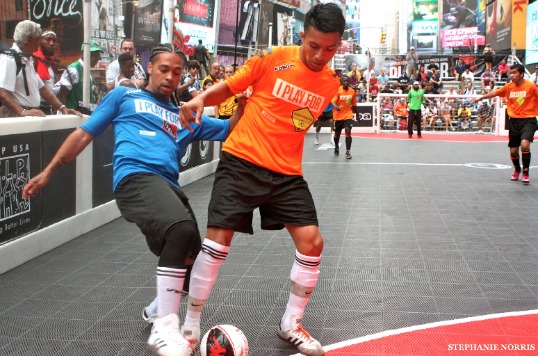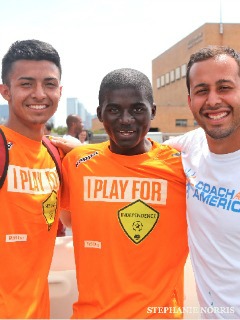
Lisa Wrightsman was a Division I soccer player at Sacramento State, who graduated as one of the leading scorers in school history with dreams to play professionally.
But when those opportunities didn't happen, she instead found herself addicted to a new and more dangerous game: A bad spiral into drugs and alcohol.
It ended up, in part, being soccer that saved her once again thanks to Street Soccer USA, a program that provides homeless people a place to play the game as a means to recovery and getting a job again.
"I kind of felt like I had wasted 20 years of experience playing soccer, so when this opportunity came back around it was the best of both worlds, because I could do this forever," she said. "When you're a pro or trying to go to the Olympics, there's a clock you're racing physically, so this is kind of an awesome thing to come into."
Now, like many graduates of the program, she's not only clean -- but encouraging other women she coaches to change their lives by coaching. She was one of many coaches cheering on, encouraging and adding in helpful suggestions at the National Cup, a tournament featuring players from all around the country playing on a small field in the middle of Times Square on Monday.
"A lot of the women I work with are in recovery from addiction to alcohol or drugs and they're very good at manipulating," she said. "And they're very good at putting on a front and out here, they’re the most honest version of themselves. This weekend was the first time I saw them see the moment -- not only did they recognize, but they took it. They're kind of at the point in their life if they can do that here -- they can do that when they go back home.”
For Akeemo Edwards, who came to New York from Georgia where he lived with his mother and brother to get to know his father (a relationship which didn’t end up working out), the soccer league proved to be a good alternative to hanging out inside the homeless shelter where he is staying. He said he was sitting in the shelter one day when he noticed a few people kicking the ball around outside.
"I didn't know New York, so it’s the best way to get to meet people,” he said of the program.
Since joining the league seven months ago, Edwards, who mostly plays defense, says he's graduated from technical school and is looking for work as an heating refrigeration, ventilation and A/C technician.
"Guess what? We're in the summer, we're in a hot town,” he said. "If you need to be cool, call on me because I can keep you cool."

Street Soccer USA began in 2007 when the program's founder, Lawrence Cann, began visiting homeless shelters and finding anyone who wanted to play. It's now in 20 cities across America and is meant to give players not only on-the-field skills, but the discipline, schedule management and teamwork aspect of the game that translates into success off the field.
"It's about trust,” Cann told Time.com. "We make them feel comfortable. We get them to trust us, and we use that trust to help them move up.” Soccer gives order to their lives that have none.
The results are astounding: 75 percent of the program's graduates have been connected to jobs and housing, complete a rehabilitation program, or further their education within a year of joining the program.
There's also great rewards for many participants who make good progress, including a trip to the Homeless World Cup tournament, which has been held in exotic locations from Brazil to Mexico. Being selected for the tournament is based on the players’ progress in getting over their drug addictions, education and finding employment.
In Times Square on Monday, fans, coaches, volunteers and the occasional tourist wandering through pressed their faces against the makeshift fenced-in field, where players competed in often incredibly competitive games of four-on-four. Because the field, which resembles a small indoor soccer field, is so small it’s conducive to players with stronger foot work and speed. The game where Wrightsman's team played went into penalty kicks.
Wrightsman had competed in Brazil at the 2010 Homeless World Cup as a player, and she said even though her team perhaps wasn’t as competitive as other ones she’s played on, it proved to be a valuable lesson.
"My team was not good and in my college days I was like, 'If you're not good, you're jacking up my game I need you off the field. And in that situation I was the only one who had played soccer -- it was so much … I just started playing my best for them and trying to get for them to know what it was like to win. I wasn’t concerned about if they were slowing me down or if they were in my way, and that was a pretty incredible experience for me because I (used to be like) if we're not winning it doesn’t count. But there I thought, we're probably not going to win -- how do we make this count?"




